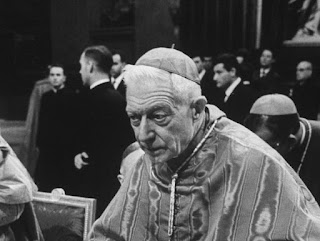This blog reported in 2017 that Jorge Bergoglio ("Pope" Francis) participated in--and continues to promote--pagan "life-force channeling", known as Reiki. He had consulted with, and used, a pagan Taoist monk named Liu Ming (See http://introiboadaltaredei2.blogspot.com/2017/12/francis-and-dark-side-of-force.html). I was castigated in the comments by a Vatican II sect apologist who claimed that I "inferred things," and that Traditionalists "spin everything" against the false pope. Not only have later developments proven me correct, but now His Wickedness is openly involved with yoga and transcendental meditation ("TM"). The Vatican II sect openly promotes yoga, and earlier this year, the Modernist Vatican held a Conference to "unite people without prejudice to stimulate an open dialogue and catalyze an interdisciplinary approach to tackle major health care challenges around the globe." (Remember when the Vatican had a real pope and they were concerned for the health and salvation of souls?).
Not only did Bergoglio invite the scum of the Earth ( pro-abortion and pro-sodomite former U.S. Vice-President Joe Biden), but he invited Satanic pop-star Katy Perry to talk about TM, and former physician turned occult guru Deepak Chopra to deliver an address. This post will expose the evil embodied in Perry and Chopra, as well as the inherently occult practices of yoga and TM.
Katy Perry
Katy Perry is an example of perversity on parade. Born Katheryn Hudson on October 25, 1984, she is seen as wholesome because her father was a Pentecostal minister and she grew up on Gospel music. Her first album was Christian music. Then, she claims in an interview, "When I was 15, because I grew up in a household where all I ever did was listen to gospel music…. I swear I wanted to be, like, the Amy Grant of music, but it didn’t work out, and so I sold my soul to the devil."
Her first big hit after selling her soul was I Kissed a Girl, which is about a lesbian encounter. Later her own father would break down in tears over her choice to serve Satan. He would later acknowledge, as she did earlier, that Perry is doing Satan’s work, exclaiming, “My girl Katy Perry is a devil child.” He stated, "I was at a concert of Katy’s where there were 20,000. I’m watching this generation, and they were going at it. It was almost like church,” Keith said. “I stood there and wept and kept on weeping and weeping. They’re loving and worshiping the wrong thing.” (See http://www.thesun.co.uk/sol/homepage/showbiz/4911473/katy-perry-preacher-father-in-devil-child-rant.html).
Perry received the Human Rights Campaign’s "National Equality Award" for her "LGBT" sodomite-perversion activism in March 2017. "Truth be told, I did more than that," Perry proclaimed as she discussed her song I Kissed a Girl after getting the award. (See https://www.youtube.com/watch?v=CBjN4DgDLCc). She told Glamour Magazine she would re-write the 2008 pro-lesbian song to make it even more perverse, "We've really changed, conversationally, in the past 10 years...We've come a long way. Bisexuality wasn't as talked about back then, or any type of fluidity. If I had to write that song again, I probably would make an edit on it. Lyrically, it has a couple of stereotypes in it. Your mind changes so much in 10 years, and you grow so much. What's true for you can evolve."(See https://www.glamour.com/story/katy-perry-would-rewrite-i-kissed-a-girl-video).
An ardent supporter of murdering unborn children, Perry donated $10,000 to Planned Parenthood. In the video "Bon Appétit," Perry is cooked by chefs and offered as a meal to a party of elite guests as the main course. The video ends with Perry about to eat a pie containing body parts of the guests. It is a gruesome tribute to cannibalism, another occult/pagan practice. Katy Perry was invited to speak on the topic of TM; more on that below.
Deepak Chopra
Born in India (1946), Deepak Chopra completed studies in medicine before coming to the United States to complete his residencies in Internal Medicine and Endocrinology. In 1985, he became involved in the TM movement, studying directly under Maharishi Mahesh Yogi (d. 2008), the founder of the movement. He left medicine to promote occult/New Age alternative medicine and began writing books. After appearing on Oprah in 1993, his career took off. He has written extensively (approx. 50 books), including yoga and meditation.
His 2008 book, The Third Jesus, exposes his false and blasphemous teachings. He tells us the "first Jesus" is the historical Christ Who is fictitious and Whom we must leave behind. The "second Jesus" is comprised of interpretations of both Biblical sayings of Christ, and false sayings from the Gnostic gospels which are false and uninspired writings. The "third Jesus" is (no surprise) a New Age guru because, he tells us, Christianity has not only failed to help people follow Christ, it has created a false Christ who keeps Jesus’ true intentions hidden.
What is this "New Age Christ" like? Some of his traits:
- Jesus is a spiritually advanced being who provides an example for us to achieve our own "spiritual evolution." He is often compared to, or paired with, Buddha. Thus, Chopra insists, "the Christian seeker who wants to reach God is no different from the Buddhist. Both are directed into their own consciousness" (Third Jesus, 87).
- Jesus death on the cross and his Resurrection are of little or no importance. Thus, a significant part of the Gospels (roughly a quarter of those texts) is simply ignored or dismissed as unimportant.
- Extra-biblical documents, especially Gnostic texts, are used and regarded as authentic sources for the life of Jesus.
- Bible passages are given esoteric interpretations that contradict orthodox understandings, as well as historical facts.
What is are pagans/occultists doing with Bergoglio? Pushing TM and yoga!
Yoga and TM
Millions of Americans (and countless millions more worldwide) practice yoga. Vatican II sect churches promote it, and conduct classes on their property. Yoga is perceived by most people to simply be another form of exercise. Many fool themselves into thinking that you can adopt the physical aspects of yoga divorced from its religious roots. This is simply false. It can be said that there is no Hinduism without yoga and no yoga without Hinduism. Yoga influences and has been influenced by Buddhism and Jainism; that's three pagan religions. These facts strongly suggest that yoga is primarily spiritual in nature, which is the explicit understanding of its Eastern practitioners, and many Western devotees.
Yoga is synonymous with Eastern meditation and pantheism, the idea that reality is identical with Divinity, and that all-things compose an all-encompassing, immanent "god." The goal of the yoga practitioner is to unify himself/herself with the "Divine-self" or "God-Self." Through yoga meditation, the person tries to lose contact with the conscious mind for an altered state of consciousness. This disassociation is meant to allow a person to become "one" with "the Divine." Even those who do not get to such altered states, have unwittingly opened themselves up to a decidedly pagan worldview and possible demon possession. The idea of being "divine" is the opposite of Christianity which tells us we are sinners in need of Redemption by the God-Man Jesus Christ.
When yoga techniques are labeled as "relaxation techniques" or "ways to reduce stress," it is misleading. Traditionalist Catholic meditation is the conscious, focused, reflective, cognitive attention to God, such as when one meditates on the mysteries of the Most Holy Rosary. Yoga meditation results in an altered state of consciousness; really a form of self-hypnosis.
The issue still needs to be addressed if yoga can be separated from its pagan aspects and just be used as exercise. Experts in yoga seem to agree that you cannot do so. Swami Prabhupada states, "Yoga is full of surprises. The first surprise was that it is not simply exercise. Yoga is a moving meditation, a system for developing the mind, the body, and the spirit in unison. This holistic approach makes yoga feel different from Western sports training." (See A.C. Bhaktivendanta Swami Prabhupada, The Quest for Enlightenment, Bhaktivendanta Book Trust , Los Angeles, [1977], pg. 3)
Transcendental Meditation (TM) is a veiled form of Hindu yoga, though it claims to be a religiously neutral method of relaxation and rejuvenation. Initiates to TM receive a mantra (Hindu holy word) to repeat while sitting in yogic postures and engaging in yogic breathing. The goal is to find God within their own beings, since God (Brahman) and the self (Atman) are really one. In the 1960's Maharishi Mahesh Yogi came to the United States, which was then torn by race riots, drug abuse and a rapidly deteriorating youth scene. He began to lecture on the merits of TM as a "scientific" answer to all spiritual and mental ills of humanity. Immediately, he was hailed a "savior" who was bringing the exact answer at the right time. Yoga nad TM caught on. When he died in 2008, his foundation for TM in the U.S. was worth an estimated $300 million.
In 1989, the Modernist Vatican, under Wojtyla, issued a "Letter to the Bishops (sic) of the Catholic (sic) Church on Some Aspects of Meditation." It came from The Congregation for the Doctrine of the Faith (sic) under Ratzinger, and in para. #12 we read:
"With the present diffusion of eastern methods of meditation in the Christian world and in ecclesial communities, we find ourselves faced with a pointed renewal of an attempt, which is not free from dangers and errors, to fuse Christian meditation with that which is non-Christian... These and similar proposals to harmonize Christian meditation with eastern techniques need to have their contents and methods ever subjected to a thorough-going examination so as to avoid the danger of falling into syncretism."
A "danger of falling into syncretism"? Too late. Syncretism, or the attempt to fuse together different belief systems, already took place at Vatican II. The term "ecclesial communities" belies the false ecclesiology of Vatican II where all religions are more or less good. As stated in the heretical document Nostra Aetate, "Thus in Hinduism, men contemplate the divine mystery and express it through an inexhaustible abundance of myths and through searching philosophical inquiry. They seek freedom from the anguish of our human condition either through ascetical practices or profound meditation or a flight to God with love and trust...The Church, therefore, exhorts her sons, that through dialogue and collaboration with the followers of other religions, carried out with prudence and love and in witness to the Christian faith and life, they recognize, preserve and promote the good things, spiritual and moral, as well as the socio-cultural values found among these men." (para. #2).
Furthermore, how does something innately pagan get "subjected to a thorough-going examination"? What does that even mean? Telling people yoga and its Eastern meditation (TM) are in any way "Christian" is more than "stretching the truth," it's an outright lie.
Conclusion
How will "Recognize and Resistors" (R&R) and Vatican II sect apologists spin this one? Bergoglio invited pro-abortion, and pro-sodomite occultists to the Vatican. They were there in order to promote pagan yoga and TM which open people to demonic forces and advances a pagan worldview. Can anyone with a straight face say, "He didn't know?" A couple of years ago, Frankie said that yoga "has no answers." However, his actions speak louder than his nebulous words. Bergoglio is no pope. No Vicar of Christ would do this; he is advancing the revolution of Vatican II. That revolution wants a world devoid of Christ and His One True Church.









